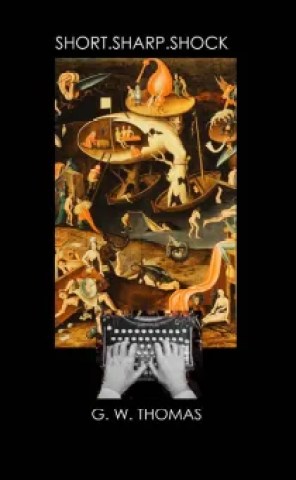 This post is brought to you by Short.Sharp.Shock by G. W. Thomas. A collection of 100 Micro-Fictions, this volume is largely a Horror anthology but spiced with black humor. The book finishes with a short piece on how to write Micro-Fiction.
This post is brought to you by Short.Sharp.Shock by G. W. Thomas. A collection of 100 Micro-Fictions, this volume is largely a Horror anthology but spiced with black humor. The book finishes with a short piece on how to write Micro-Fiction.
The Story of Gilgamesh is the first story we know about. It was written on clay tablets and no one listening to it wanted it to end quickly. Stories were originally leisurely things to be enjoyed by a collective audience over many nights. By the time the myth had become the three-decker novel, the tale was told more often in solitude, but still at a snail’s pace.
So why does Micro-fiction exist? Well, when was the last time you gathered with all your family to hear the scop sing of Beowulf? Before you laugh, if you are like me, you spend your New Year’s Eve watching the entire The Lord of the Rings trilogy. We still binge, but the television is more convenient than hiring a troubadour.
Tales of a short nature grew out of magazine publishing. Writers like O. Henry devised short stories that had a sting in their tail, giving us the “surprise ending”. This model worked well for the Internet fiction that got a new name: “Flash”. Flash Fiction is defined these days as a tale of no longer than 1500 words. (Micro-Fiction and the Drabble are even shorter versions of the short-short story.) Our attention spans have shrunk since the days of Hrothgar’s beer hall or The Mysteries of Udolpho, with readers needing a small snack rather than a gluttonous word-feast.
But can you actually write a short story in only 100 words? A story is defined as a tale with a beginning, a middle and an end by that old Greek, Aristotle. The answer is yes, but it requires a few tricks. As a writer you must work with the skill of a stage magician, hiding, suggesting, leading your reader to the final reveal of your trick. If done right, they almost always ask themselves, how did you do that? But consider first: writers get paid by the word. If you have a market that will pay you for 7500 words, why go for less? So first consideration is to determine if your story suits a short delivery. If you feel like you need to create more characters, add extra subplots or just love long descriptive passages, then forget about Micro-Fiction. A story suited to this short-short treatment is one that is largely driven by plot or just a glimpse at a bigger picture.

Let’s be really clear here about two related story types that aren’t Flash Fiction. These are jokes and poetry. A joke, like a flash story, has a pay-off at the end. What it doesn’t have is real characters. “A guy walks into his doctor’s office….” The guy could be anyone. Probably someone stupider than you, but the pay off is a laugh. And that’s all. Structurally similar but far more stripped of what makes a story a story. You don’t have a ton of words for characters but you do need to give the reader a character. This is often done with allusion or relating small aspects of their lives to points in your own life. A girl who is pregnant and can’t go home to her parents, that a character. There needs to be conflict, just like any other story.
Poetry, especially narrative poetry or prose poems, can look an awful lot like Micro-Fiction. (If that’s your thing, check out Prairie Cemetery.) But the poet is not restrained by plot, conflict, even character. You could write a 100 word poem about colors in a drop of water if you want. But it’s not a story. Poetic skills are useful to the Micro-Fiction writer because poetry can be so much more concise than fiction. If being a little poetic allows you to skip a paragraph, then why not? For example, I could write a block of text about how Tim works at a restaurant and but he is too shy to get tips or I could just say “Timorous, Tipless Tim”.
Conclusion
Micro-Fiction, despite the smaller cash reward, can be quite useful for a writer. It allows you to use small ideas that may not work in any other pieces. It can get your words into publications that don’t use longer fiction. Flash Fiction of all kinds can also be a testing ground. That short piece could develop into a longer one. As an aid against Writer’s Block, it may free you enough to get you writing again. The pressure is off so have fun! When you collect a hundred of these unrestrained tales, you get a glimpse into the dark mind of the writer like no other.




